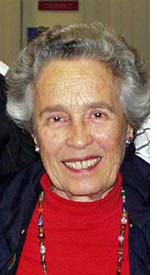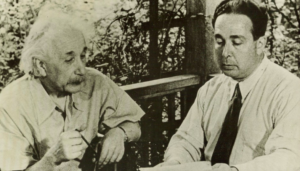
LA JOLLA, California — Szilard Biographer William Lanouette and geneticist Matthew Meselson will celebrate the 125th anniversary of Leo Szilard’s birth and the Szilard archive held in UC San Diego Library’s Special Collections & Archives on Thursday, Nov. 2, from 4-5 p.m. online. To register for “Leo Szilard’s Legacy: Science in the Public Interest Today,” visit: https://ucsd.zoom.us/webinar/register/WN_7-svkpF5R42IG1hy9Kcm3w
Leo Szilard (1898-1964) first envisioned nuclear chain reactions for energy and bombs, and with Enrico Fermi, co-designed the world’s first reactor. His broadened research redefined basic concepts in molecular biology and he helped found The Salk Institute for Biological Studies and other institutions.
I first became aware of Leo Szilard in 1958, when I was homebound with my first newborn. I tuned into public radio, and heard his lectures. I was impressed by his brilliance, his delightful sense of humor and his ability to explain complex scientific concepts in layman’s terms.

After moving to San Diego in 1966, two years after Szilard’s death, I had occasion to meet his widow, Trudy Weiss Szilard, and we became friends. She was a welcome guest at our Passover Seders and Chanukah celebrations. A remarkable person in her own right, Trudy specialized in public health. She served as a consultant to the World Health Organization, the Pan American Health Organization and as project director for the Southeast San Diego Health Study in 1968 and 1969. Her brother, Egon Weiss, was the head librarian at West Point, and her sister, Franziska Weiss Racker, followed in her older sister’s footsteps, specializing in public health.
Trudy spent the years after Leo died organizing and publishing his writings. In 1970, “The Collected Works of Leo Szilard: Scientific Papers,” was published and in 1978, “Leo Szilard: His Version of the Facts, Selected Recollections and Correspondence,” was published. Egon Weiss’ daughter, Helen Weiss, a documentarian, produced the NOVA documentary, “Genius Behind the Bomb,” and in 2013, William Lanouette, with the help of Leo’s younger brother, Bela Silard, wrote “Genius In The Shadows, A Biography of Leo Szilard, the Man Behind the Bomb.”
When Szilard escaped Vienna to England, he spearheaded the founding of the Academic Assistance Council, which helped find positions for the many jobless Jewish academics in Germany and Austria, fired by the Nazis. He also worked closely with a Jewish committee, helping raise funds and providing jobs and fellowships.
He looked at science holistically and espoused humanitarian causes. Szilard was a strong advocate for limiting nuclear proliferation. He founded the Council for a Liveable World, an organization that still exists.
In 2018, the Salk Institute s auditorium was the venue for a play by Peter Cook and William Lanouette, “Uranium+Peaches,” depicting the meeting of Leo Szilard and Harold Urey with Jimmy Byrnes, Truman’s advisor, in Byrnes’ South Carolina home. Szilard and Urey tried unsuccessfully to convince Byrnes to advise Truman to demonstrate the bomb’s potency before its use on Japanese cities.
In 2019, the Leo and Trudy Szilard Chancellor’s Endowed Chair was established to support faculty in the Jacobs School of Engineering who hold a joint appointment with the Salk Institute.